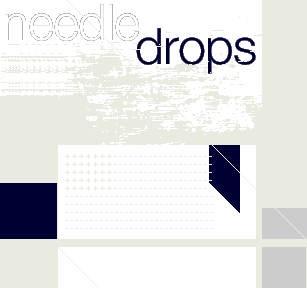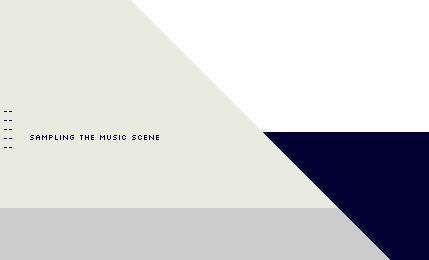


++ Contact Philip Sherburne ++
++ Recently ++
Tuesday, November 29, 2005 = The Stooges Unearthed (Again)
Tuesday, November 8, 2005 = Documenting Beulah And DCFC
Tuesday, November 1, 2005 = Out-Of-Control Rock 'N' Roll Is Alive And Well
Tuesday, October 25, 2005 = Just In Time For Halloween
Monday, October 3, 2005 = The Dandyesque Raunch Of Louis XI
Monday, August 15, 2005 = The Empire Blues
Tuesday, August 9, 2005 = David Howie's Sónar Diary
Monday, July 25, 2005 = Hot Sounds For Summertime
Monday, June 27, 2005 = Overcoming Writer's Block At Sónar 2005
Monday, June 4, 2005 = Cool New Sounds To Download Or Stream
++ Needle Drops Archives ++
View full list of Needle Drops articles...
|
|
 |
Friday, January 17, 2003
++ Bringing It All Back Home
Valparaiso, Chile — When I last checked in, it was to try to come to terms with the sweet haze of Valparaíso porch-sitting and to report on the ecstatic convulsions of the city's New Year's Eve celebrations — the centerpiece of its identity. (A Valpo resident told me just yesterday that local homeowners value their property according to the quality of the view — not of the water, but of the fireworks.) Now, in a passing of time as strange and fuzzy as the foam atop a pisco sour, MicroMUTEK Chile, the Canadian organization's first foray into Latin America and a primer for a five-day festival in January 2004, has come and gone. I'm a little sunburnt, a lot tired, and excited beyond belief about the state of electronic music here.
Let's run the numbers. A forest of fliers (20,000, to be precise) was spread from Santiago to Reñaca, the tony beach resort north of boho Valpo; distinctive white-and-orange posters were plastered wherever wheat paste would stick. We — an international crew of Chileans, Canadians, and myself, the lone Yanqui — spread the word at poolside techno parties, swank nightclubs, cramped record stores, and even a port-side '80s club where the DJ spun eight Madonna songs back to back and the least feminine drag queen I've ever seen lip-synched to Björk's "It's Oh So Quiet." (You haven't really lived, by the way, until you've heard some 300 Chileans singing along at top volume to "Like a Virgin," accents and all.)
Some 2,700 tickets have been torn, including exactly one counterfeit, and thousands more beer cups wetted and trashed. An arsenal of audio equipment has been set up and dismantled. Fourteen hours of DATs have been loaded up with live sound and spooled into a holding pattern, awaiting eventual release. Hours more of digital video and lord knows how many digital photographs now swell the global pixelscape by about an iota.
Two local youth learned basic lifeguarding techniques in a dinghy off the pier only hours before the event. One coin-operated telescope was wrenched from the pavement in order to move one of the two decommissioned cranes that were to suspend the hanging stage; one set of crane brakes failed when the stage proved too heavy (fortunately, this was the day before the event).
The sun set and rose over the pier and set again on the afterparty. And yes, more than a few noise complaints were lodged by neighbors who just couldn't understand why the infernal boom boom boom boom was still ricocheting off the hills overlooking the harbor at 9:30 in the morning after the party. (Several of these complaints were logged in the Mercurio's article, "Festival Tecno: Arte o Molestia?", a pointed title if ever there were one.)
Ample flesh was pressed and untold amounts of press fleshed out, and throughout it all, I found my own role blurring. No longer the impartial critic I was when I first visited MUTEK in 2001, nor the participant/observer I was in 2002 when I led two panel discussions, this time I was a performer, assistant, gofer, salad-maker, flyer distributor, PR contact: in other words, a cog deep within the machine, so consider this column one long full-disclosure statement.
++ I fumbled my way through three radio interviews in Spanish — the biggest at Santiago's commercial station Radio Concerto, and the smallest at Valpo's Radioneta, a pirate station with a 7-watt transmitter and a range of approximately three hilltops. (To give you a sense of the difference between the two, I was buzzed in by security at the glass-cased, 10-story building in Santiago, whereas in the studio of Radioneta — a lone room in a residential house on a cobblestoned street swarming with amiable stray cats — the station manager offered to roll up a joint before starting our hourlong chat. I politely declined, explaining that Spanish was difficult enough as it was.) I was interviewed by a lovely journalist from the Mercurio of Valparaiso, whom I inadvertently offended when I called her "huevón" (the most common word in all Chilean slang, meaning roughly "dude") in precisely the wrong tone of voice. (Just when you think you've got the slang down pat, it comes back to bite you in the ass.) I even had a bizarre appearance on live TV, DJing "musica en el estilo MUTEK" — my San Francisco colleagues in Soft Pink Truth and Broker/Dealer will be pleased to note that they were generously represented — while a reporter touted the fiesta de tecno and Rocio, our tenacious chief of local PR, gently admonished him that it was a festival, not a fiesta.
But such distinctions are not so easily made in Chile, where electronic music is something of a rarity amongst the general populace and progressive house is still the predominant style. Not that there aren't other options: after all, Germany's Atom Heart lives here in Santiago, providing the home base for a Chilean diaspora that includes Ricardo Villalobos, Dandy Jack and the Latin Luvas, Luciano, Closer Musik, Christian Vogel, and others.
In addition to such purveyors of commercial crap as Dave Seaman, plenty of top-notch foreign artists visited town while we were here: Luomo, Common Factor, Rob Mello, Toby Neuman, Alexi Delano (a New York resident, but also a Chilean, as I learned). And even if the import vinyl in the record shops in Santiago is priced out of the range of most DJs, just about everyone can find anything they want on the Internet. Indeed, Radioneta's music catalogue exists only in MP3 format, and their broadcast consists of a 24/7 WinAmp stream uploaded to the transmitter, playing everything from Fila Brazillia to Talk Talk. And Chile itself is home to a number of emerging experimental electronic musicians, including Santiago's Andres Bucci, Tec (Rodrigo Castro), and Gabriel Vigliensoni, all of whom played at the festival.
++ In any case, the festival turned into a fiesta, nomenclature be damned. During early ambiance from the Chilean artists and spiky shadowboxing from Montreal's Mike Shannon, the mood amongst the slowly growing crowd remained tranquilo. (Even at midnight, the event was no more than half-capacity: Chileans, like Spaniards, Brazilians, and Argentinians, go out late. In fact, hardly a soul was there for my own 8 p.m. set time, but with the sunset behind me, a cool breeze across the decks and the occasional pelican nose-diving in time to the rosy minimal techno I'd selected, I could hardly complain: who needs an audience when you've got the elements on your side?)
Maybe people just wanted to keep warm, but by the time Miss Kittin finished a processed wail and tore into a set of acid house, booty bass, and cheeky techno, the crowd whipped itself into a frenzy that didn't let up until well past sunrise. The faces in the photos say it all, ecstatic (with a small "e") countenances absolutely in tune with the music, the space, and the crowd. The wee hours are as blurry as the bubble animations rippling across the "membrane," a white screen made of sail-fabric hung from the two cranes, but certain highlights stand out.
Luciano's rousing bootleg of the theme from Amélie, all accordion and shuffling drums. Dandy Jack, Ricardo Villalobos, and Atom Heart's hours-long collaborative improvisation, braiding each others' rhythms like a horsewhip to drive the crowd on and on. And finally Vince Lemieux's three-hour closing set, the sweat bright on his brow in the hot sun, the dancers unceasing despite the lack of sleep or morning cafecito.
++ Techno parties are nothing new in Chile, but time and again we were told that this was something different. It's hard to say why: doubtless, some of the enthusiasm may come from the fact that it was a foreign production. Chileans have a strong sense of national identity, but isolated from the rest of Latin America and with strong ties to English immigrants of more than a century ago, they often look restlessly outward for inspiration and, perhaps, validation. But I think above all it was the level of intention that distinguished the event from the run-of-the-mill raves, chillouts, and "afters."
Every choice had a reason behind it: Valparaíso for its emergent cultural importance, the pier as a reclamation of public space, Chile itself as a promising platform for an emerging dialogue of pan-Americanism. Of course, with the spread of the likes of Au Bon Pain, Payless Shoe Source, Burger King, and more, it's impossible not to ask if transplanting MUTEK in Chile is just a subtler kind of cultural imperialism. But I prefer to look at it as a new kind of grassroots globalism, lending a certain infrastructure to a place with a strong sense of self, and acting as a carrier for Chile to project itself onto the world stage.
The Chilean diaspora has been increasingly active in the last five years, but despite its own cohesion, much of the global audience is unaware of its interconnections and origins. MUTEK may be a Canadian organization, but with more extensive events planned for Chile (2004) and Berlin (2005), and further MicroMUTEKs in the works for New York, Brazil, and Argentina, it's clear that for all of us — organizers, performers, attendees — geographic fealty is a delightfully fuzzy concept. For two dizzy weeks and 14 delirious hours, the adventure in Valpo felt like a first step in bringing it all back home.
|
| |
|